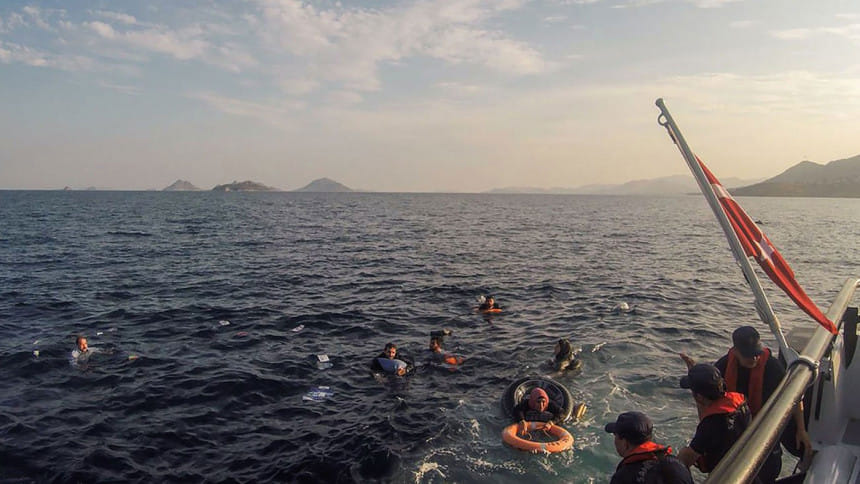The price of a migrant worker’s dream

May 27, 2020 marked another dark chapter in the history of global migration. On that day, 26 sons of Bangladesh were brutally murdered in Libya. The crime for which they paid this ultimate price was that they dared to dream! They dreamt of having a better life. They had the audacity to reject the rigid class-based society of theirs, which offers little scope to make an upward transition in life. Had fate been kind to them, they would have made it to Italy, or Spain, or some other European nation. They gambled with their life and lost the game. How long can such gambling continue?
Unfortunately, we have no answer to that because the odds are always stacked against these young men. Think of Asadul, one of those hapless victims. There was no land for him to cultivate. What job prospects did he have? Are education and individual capabilities sufficient to secure a job? Did he have the right political contact or money to bribe his way into a job? Was business an option for him? Where would he get the capital needed? Would any bank offer him loan without collateral?
But don't we, one may ask, have the anti-trafficking law of 2012 that is supposed to stop these tragedies? So many judges, lawyers and police personnel have been trained to enforce the law. So many NGOs have taught the villagers how to file FIRs. So many tele-dramas have been aired to highlight the plight of migrant workers. In reality, rules to implement the law were only framed in 2017. The majority of the special courts are yet to be established. Trafficking cases are tried in special courts of women and children. There have been so many cases of abuse against women—dowry-related violence, acid throwing, physical torture by husband or in-laws, etc. Our understaffed judiciary cannot handle all these cases, let alone cases against traffickers. Till 2019, out of 5,700 cases, only 250 were resolved. The kingpins remain above the law. Who will dare to give evidence against them? Fifty-four petty foot soldiers were convicted.
One cannot help but think how brave those young men were. Asadul went from Madaripur to Kolkata via Benapole by bus, and from Kolkata by plane to Mumbai, Dubai, Cairo, Benghazi, and finally almost there to Tripoli. It is hard to believe that this young man had never stepped out of Madaripur before this journey.
There are so many questions that come to mind. Why have the western powers made such a mess of countries like Iraq, Iran, Kuwait and Libya where our men used to go for work? Why have the western powers enacted a policy of "Fortress Europe" when employers of those countries are so happy to use irregular migrants? Why have the developed states not treated trafficking with the same vigour as they did radical extremism? Perhaps, they feel they have played their due part by shuffling Bangladesh between tier 2 and tier 3 in the Trafficking in Persons (TIP) Report.
Our law enforcement agencies have cutting-edge surveillance equipment. Yet they have failed to apprehend the masterminds who traffic innocent youths by preying on their hopes and dreams.
Take the case of a young man named Zillur. He was also stranded in Libya while trying to go to Europe. Zillur left Bangladesh on a tourist visa to Sudan through the Chittagong airport. Isn't it strange that our immigration officers did not think it odd that an illiterate person, with no history of travel and a brand new passport, should suddenly decide to go to Sudan for tourism? Did border and coast guards spare a thought as to why hundreds of poor Bangladeshis and Rohingya men, women and children were migrating to Thailand by boat? Can you recall any case where a member of law enforcement or of the civil administration was held accountable for these tragedies? In political science, we call this impunity.
I call migrant workers "today's freedom fighters". In 1971, freedom fighters gave us independence. Today, migrants are pushing the country forward by earning foreign exchange. For so many years, we have been honouring the achievements of migrants and their left-behind families as shonar manush—the golden sons and daughters of Bengal. We even framed a slogan: "The sweat of the migrants earning, keeps the wheels of our country turning."
I have dedicated 25 years of my life to this cause. But today, I can celebrate migration no more. My heart has been broken along with the mothers of all those poor young men. I can no longer paint migration as a life-enhancing experience for many. Neither can I call it a tool for development with the conviction I once did. For the poor rural families, it has turned into an enticement to enter the jaws of death—or at best, the quickest path to impoverishment.
Tasneem Siddiqui is Founding Chair, RMMRU, and Professor of Political Science, University of Dhaka.

 For all latest news, follow The Daily Star's Google News channel.
For all latest news, follow The Daily Star's Google News channel. 



Comments